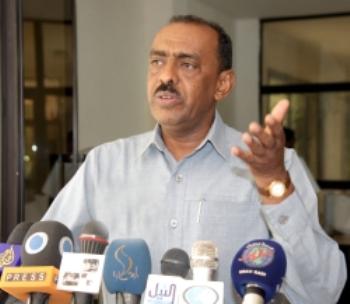Sudan accuse Western countries of working to thwart AU’s ICC decision
August 2, 2009 (KHARTOUM) — The Sudanese government today accused Western countries of seeking to circumvent the African Union (AU) resolution halting cooperation with the International Criminal Court (ICC) in apprehending president Omer Hassan Al-Bashir.

Rights groups and some African diplomats have accused the Libyan leader Muammar Gaddafi of “bullying” reluctant African countries to adopt the resolution.
The AU Secretariat issued a statement in mid-July dismissing such claims saying that the decision was reached by consensus “with only one opinion to the contrary, which was duly recorded as a reservation,”.
However, the African states of Botswana, Chad, Uganda and more recently South Africa have publicly said they will arrest Bashir irrespective of the AU resolution.
Ali Al-Sadiq, the Sudanese foreign ministry spokesperson and the appointed ambassador to Greece, said that pressure from Western powers aims at annulling the AU summit accord on ICC.
Al-Sadiq stressed that the resolution was agreed upon by African leaders to support Sudan’s position against the ICC and the “double standards” as well as the “targeting of third world countries and Africa continent in particular”.
The Sudanese diplomat said that the AU decision is binding to its members noting that any country opting not to confirm, “would be in violation of the AU’s constitution and a break from the continent’s consensus and succumbed to pressure from Western powers”.
Al-Sadiq avoided referring to specific countries. However, it is likely the statement was in response to South Africa announcement that the AU resolution is a violation of its country’s constitution and as such, it will not abide by it.
The Sudanese foreign ministry also issued a statement today saying that the Rome Statute, the founding treaty of the ICC, confers “absolute immunity on Western industrialized nations”.
The statement says it is disappointed that the Rome Statute was “carefully tailored to practically exempt the Western bloc from any possibility for the ICC to exercise jurisdiction on its citizens let alone officials and political leaders there,”.
“The principle of complementarity in its first Article that was included in the Rome Statute text, was made to fulfill two contradictory purposes; First conferring absolute and final immunity on Western industrialized nations preventing exercise of jurisdiction on it; Second, subjecting third world countries at the same time to the jurisdiction of the court even if it was not a party to the Rome Statute. No judge or prosecutor will be able to even to raise even the question of the ability and willingness of any legal system in Europe to prosecute any of its own people,” the statement reads.
Furthermore the foreign ministry said that the power of the UN Security Council (UNSC) to refer cases to the ICC or defer them “from exercising jurisdiction on Western industrialized nations” while acting as a “hanging sword on third world countries,”.
The statement also says that the Rome Statute gives wide powers to the ICC prosecutor saying that the current incumbent [Luis Moreno Ocampo] have proved how it can be used to be abused.
“It is therefore not surprising that the EU countries joined individually and collectively ascended to the founding treaty of the court which unfortunately became a tool in the hands of foreign affairs of western powers and not an independent judicial body based on justice and equality”.
The Rome Statute was ratified by 110 countries so far. Chile and the Czech Republic have joined the court this year.
The Court is currently handling four cases including Sudan, Uganda, Democratic Republic of Congo (DRC) and the Central African Republic (CAR).
With the exception of Darfur case all other cases were referred to the ICC by their respective governments.
The Darfur case was referred to the ICC by the UNSC under a Chapter VII resolution since Sudan is not a state party to the Rome Statue that established The Hague based court.
In 2004 the UNSC formed a UN commission of inquiry to look into Darfur abuses headed by former President of the International Criminal Tribunal for the Former Yugoslavia (ICTY) Italian Antonio Cassese.
The commission concluded that the government did not pursue a policy of genocide in the Darfur region but that Khartoum and government-sponsored Arab militias known as the Janjaweed engaged in “widespread and systematic” abuse that may constitute crimes against humanity.
They further said that Sudanese judiciary is “is unable or unwilling” to prosecute those crimes and thus recommended referring the situation to the ICC.
The ICC issued arrest warrants for Bashir and former Sudanese state minister for humanitarian affairs and governor of South Kordofan Ahmed Haroun and militia leader Ali Kushayb.
(ST)
